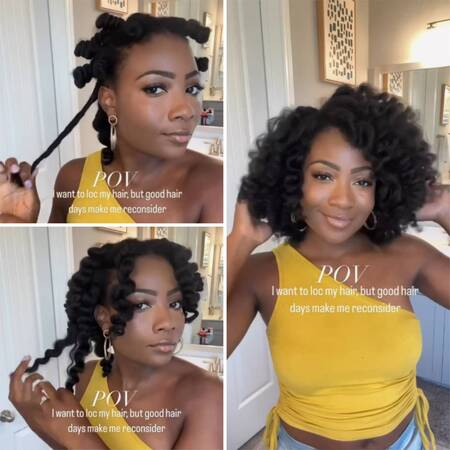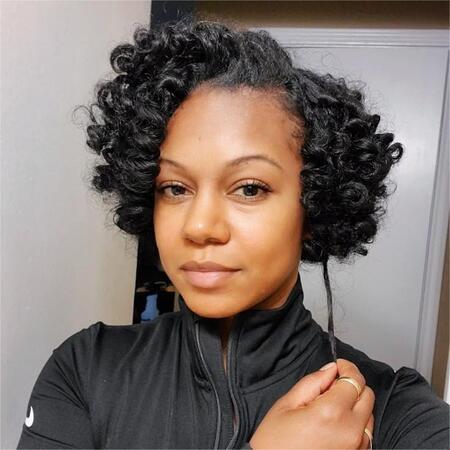
Your Expert Guide to Long-Lasting Bantu Knot Outs
Bantu knot outs are a popular and creative styling method for natural hair, known for creating defined, springy curls without heat. Picture this: You twist a section of hair, roll it into a knot like a cinnamon scroll, let it set, then BOOM—spring-loaded curls that laugh in the face of flat irons. So whether you're a beginner or looking to improve your technique, this guide provides a step-by-step walkthrough.

Source: Pinterest
What is a Bantu Knot Out and Why is it so Popular?
A Bantu knot out is a textured hairstyle created by unraveling Bantu knots, which are small, coiled buns tightly twisted against the scalp. Then you'll get beautiful, defined curls or waves that offer volume, bounce, and style versatility.
Born from the Zulu people of Southern Africa, the Bantu knots hairstyles were never just about aesthetics—they were cultural ID cards signaling age, status, and community. Today’s Bantu knot twist out is our rebellion against the "tame your coils" narrative. The magic happens when you unravel those sculpted knots into juicy, defined spirals that last longer than your weekend plans.
How to Do a Bantu Knot Out: Step-by-Step Guide
Getting a flawless Bantu knot out takes a little practice, but it’s simple enough for a beginner to master. Follow these steps for salon-worthy results at home.
1. Start with Clean, Moisturized Hair
Start with blow-dried or stretched twists. I suggest you apply a leave-in conditioner to lock in moisture because hydrated hair yields the best results.
2. Apply a Curl Enhancer or Styling Product
Use a styling cream or mousse to promote definition and hold. Choose one that offers medium hold and is curl-friendly. This will ensure your curls stay bouncy and well-defined.
3. Create Bantu Knots
Divide your hair into small, even sections with a comb. Take a section of hair and twist it from root to tip to make a small bun, ensuring the twist is tight but not so tight that it pulls on your scalp. Secure it with a bobby pin or elastic band. Repeat for all sections.
4. Allow to Set
Sleep in a satin bonnet (your knots will thank you) or blast with a diffuser if you’re impatient like me.
5. Unravel and Fluff
When the knots are thoroughly dry, gently unravel each one. Fluff and separate the curls with your fingers, styling the hair as desired for added volume and body.
✨ Tip: the only thing you need to pay attention to is the twisting direction of the Bantu knots. All the knots should be twisted clockwise or counterclockwise to create even curls. If you do it in random directions, you may end up with a messy hairstyle.
How Long Does a Bantu Knot Out Last?

Source: Pinterest
In my experience, a well-executed Bantu knot out typically lasts 3-7 days, depending on three key factors:
⚡ Hair porosity: My 4C low-porosity hair holds the pattern longer (up to a week with nighttime care) compared to my friend’s 3B hair, which loosens by day 4.
⚡ Product choice: Lightweight gels extend longevity without buildup, while heavy butter will have your curls sagging by noon.
⚡ Maintenance routine: Here’s my ritual—sleep on a silk pillowcase with hair pineappled in a loose satin scarf. If you wanna refresh it, a light spritz of rosewater mixed with glycerin reactivates the definition without residue.
Do Bantu Knots Go on Wet or Dry Hair?
The short answer: Both work, but with different outcomes.
✨ Damp hair (70% dry): My personal sweet spot. It allows for uniform curl formation while minimizing frizz. I mist my stretched hair with a leave-in conditioner before twisting, and it’s been a game-changer for consistent results.
✨ Dry hair: Ideal if you want volume over definition. When I’m aiming for a bigger fro with subtle curl patterning, I’ll work on dry hair using a foam wrap lotion for slight moisture reactivation.
✨ Avoid soaking wet hair: Early in my journey, I made this mistake—waterlogged sections lead to uneven drying and limp curls. If your hair is freshly washed, gently blot with a microfiber towel first.
What’s the Difference Between a Twist Out and a Bantu Knot Out?
While both styles create beautiful, defined curls, the techniques and results differ. Twist outs give you that "I woke up like this" flowy curl. Bantu knot twist outs give tighter ringlets with a vertical lift that makes your TWA look like a whole bouquet. Try both, but know this: Knots work better on shorter hair.
| Factor | Bantu Knot Out | Twist Out |
| Curl pattern | Tight vertical spirals | Elongated S-waves |
| Tension-type | Radial coiling tension | Twisting motion |
| Best for | Short length (creates lift at roots) | Longer hair (retains wave shape) |
| My personal take | Delivers true coil definition | Gives a "stretched" wash-and-go |
Related post: Braid Out vs Twist Out: A Guide to Stretch and Texture
Tips for Maintaining Your Bantu Knot Out
To keep your look fresh and defined for as long as possible, follow these maintenance tips:
✨ Preserve Overnight
Wrap your hair at night with a satin or silk scarf to reduce frizz and retain curl definition. Sleeping on a silk or satin pillowcase is also great for additional protection.
✨ Refresh as Needed
Use a light misting spray or curl refresher to rejuvenate your curls throughout the week. A lightweight oil can also help enhance shine and reduce dryness.
✨ Avoid Over-Manipulation
Resist the urge to constantly touch your curls. Over-manipulating your hair can lead to frizz and shorten the life of your style.
✨ Choose Weather-Friendly Products
Humidity can wreak havoc on your Bantu knot-out. Use anti-humidity sprays or products with hold to keep your curls intact.
Final Thought
Now go forth—knot, unravel, repeat. And when someone asks where you got those perfect coils? Tell them the truth: "They’ve been here for centuries." So rock those unraveled curls like they’re heirlooms, because baby, they are.